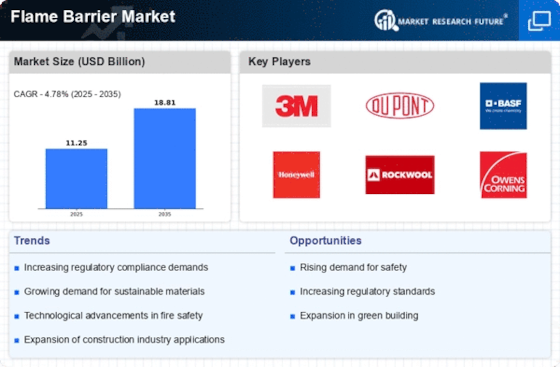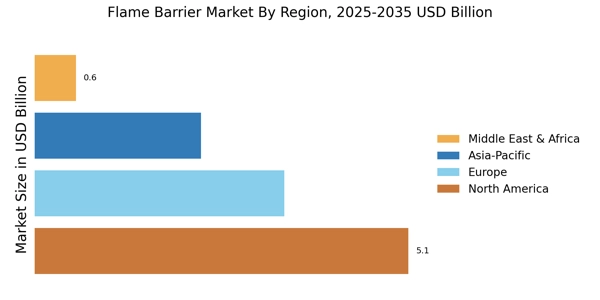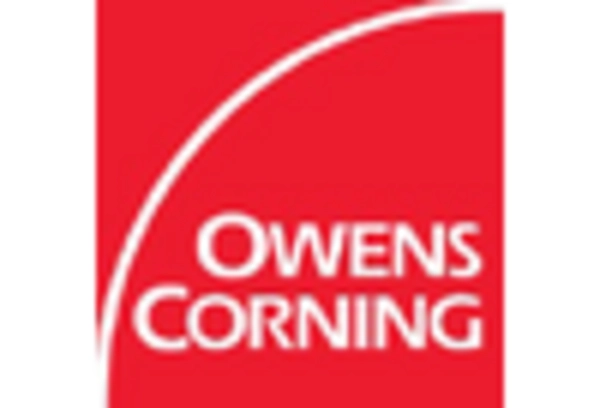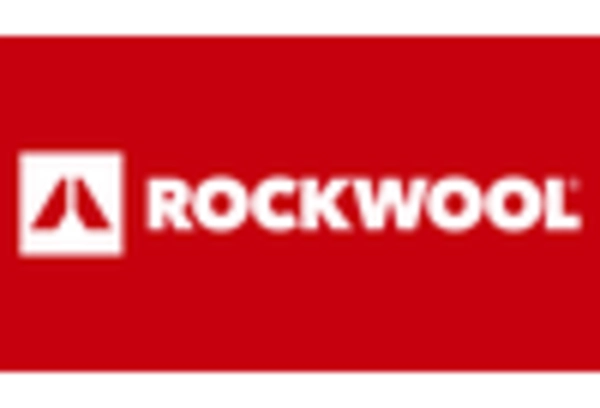Growth in the Automotive Sector
The Flame Barrier Market is also benefiting from the growth in the automotive sector, where fire safety is becoming increasingly paramount. With the rise of electric vehicles and advancements in automotive technology, the need for effective flame barriers in vehicles is gaining attention. Manufacturers are developing specialized flame barrier materials that can withstand high temperatures and prevent fire spread in case of accidents. Market projections indicate that the automotive flame barrier segment could experience a growth rate of approximately 5% over the next few years. As safety regulations in the automotive industry tighten, the demand for innovative flame barrier solutions is likely to rise, further propelling the market forward.
Rising Awareness of Fire Safety
In recent years, there has been a marked increase in awareness regarding fire safety, significantly impacting the Flame Barrier Market. This heightened consciousness among consumers and businesses alike has led to a greater emphasis on implementing fire prevention measures. Educational campaigns and regulatory mandates have played a crucial role in promoting the use of flame barriers in various applications, including residential and commercial properties. Market data indicates that the fire safety equipment sector is expected to witness a growth rate of around 6% annually, further bolstering the flame barrier segment. As stakeholders recognize the importance of fire safety, the demand for effective flame barrier solutions is likely to continue its upward trajectory.
Increasing Construction Activities
The Flame Barrier Market is experiencing a notable surge due to the increasing construction activities across various sectors. As urbanization accelerates, the demand for fire-resistant materials in residential, commercial, and industrial buildings rises. According to recent data, the construction sector is projected to grow at a compound annual growth rate of approximately 5.5% over the next few years. This growth is likely to drive the adoption of flame barrier solutions, as safety regulations become more stringent. Consequently, manufacturers are focusing on developing innovative flame barrier products that meet these evolving standards. The integration of flame barriers in construction not only enhances safety but also contributes to the overall durability of structures, thereby reinforcing the market's expansion.
Regulatory Standards and Compliance
The Flame Barrier Market is heavily influenced by regulatory standards and compliance requirements that govern fire safety in construction and manufacturing. Governments and regulatory bodies are increasingly implementing stringent fire safety regulations, necessitating the use of flame barriers in various applications. Compliance with these regulations is not only a legal obligation but also a critical factor in ensuring the safety of occupants and assets. Market analysis reveals that regions with robust regulatory frameworks tend to exhibit higher demand for flame barrier solutions. As these standards evolve, manufacturers are compelled to innovate and adapt their products to meet compliance, thereby driving market growth and enhancing overall safety.
Technological Innovations in Flame Barrier Materials
Technological advancements are reshaping the Flame Barrier Market, as manufacturers invest in research and development to create more effective and efficient flame barrier materials. Innovations such as intumescent coatings and advanced composites are gaining traction, offering enhanced fire resistance and performance. The market for these advanced materials is projected to grow significantly, with estimates suggesting a potential increase of 7% in the next five years. These innovations not only improve the safety profile of buildings but also cater to the aesthetic preferences of architects and designers. As the industry evolves, the integration of cutting-edge technologies is likely to play a pivotal role in driving market growth.

















